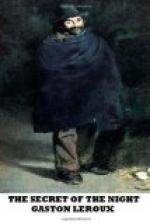a complete triumph for herself. The students,
the revolutionaries, the radicals and the cadets acclaimed
the singer, glorifying not only her art but also and
beyond everything else the sister of the engineer
Volkousky, who had been doomed to perish with her brother
by the bullets of the Semenovsky regiment. The
friends of the Court on their side could not forget
that it was she who, in front of the Kremlin, had
struck aside the arm of Constantin Kochkarof, ordered
by the Central Revolutionary Committee to assassinate
the Grand Duke Peter Alexandrovitch as he drove up
to the governor’s house in his sleigh.
The bomb burst ten feet away, killing Constantin
Kochkarof himself. It may be that before death
came he had time to hear Annouchka cry to him, “Wretch!
You were told to kill the prince, not to assassinate
his children.” As it happened, Peter Alexandrovitch
held on his knees the two little princesses, seven
and eight years old. The Court had wished to
recompense her for that heroic act. Annouchka
had spit at the envoy of the Chief of Police who called
to speak to her of money. At the Hermitage in
Moscow, where she sang then, some of her admirers had
warned her of possible reprisals on the part of the
revolutionaries. But the revolutionaries gave
her assurance at once that she had nothing to fear.
They approved her act and let her know that they now
counted on her to kill the Grand Duke some time when
he was alone; which had made Annouchka laugh.
She was an enfant terrible, whose friends no one
knew, who passed for very wise, and whose lines of
intrigue were inscrutable. She enjoyed making
her hosts in the private supper-rooms quake over their
meal. One day she had said bluntly to one of
the most powerful tchinovnicks of Moscow: “You,
my old friend, you are president of the Black Hundred.
Your fate is sealed. Yesterday you were condemned
to death by the delegates of the Central Committee
at Presnia. Say your prayers.” The
man reached for champagne. He never finished
his glass. The dvornicks carried him out stricken
with apoplexy. Since the time she saved the little
grand-duchesses the police had orders to allow her
to act and talk as she pleased. She had been
mixed up in the deepest plots against the government.
Those who lent the slightest countenance to such
plottings and were not of the police simply disappeared.
Their friends dared not even ask for news of them.
The only thing not in doubt about them was that they
were at hard labor somewhere in the mines of the Ural
Mountains. At the moment of the revolution Annouchka
had a brother who was an engineer on the Kasan-Moscow
line. This Volkousky was one of the leaders on
the Strike Committee. The authorities had an
eye on him. The revolution started. He,
with the help of his sister, accomplished one of those
formidable acts which will carry their memory as heroes
to the farthest posterity. Their work accomplished,
they were taken by Trebassof’s soldiers.




